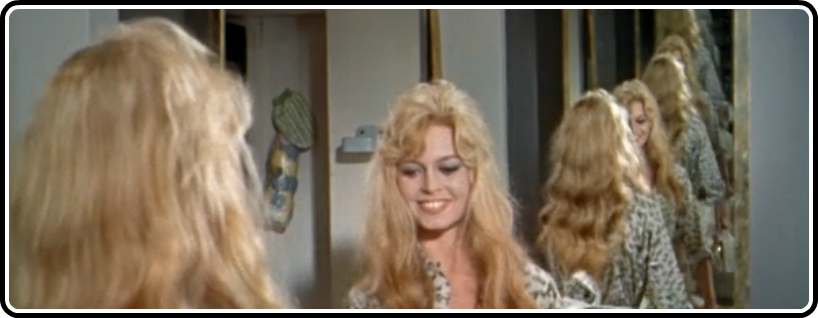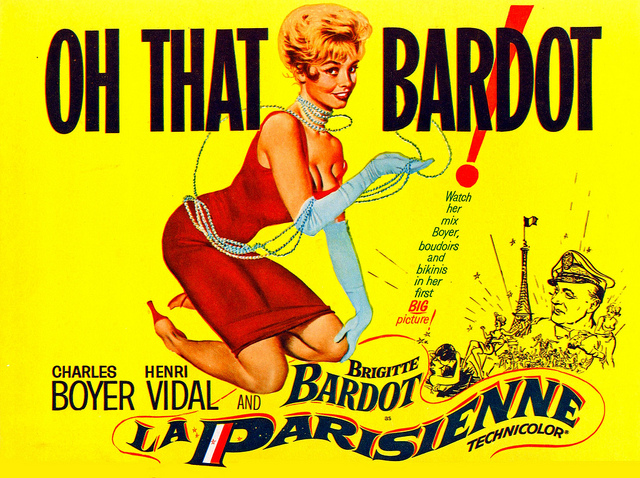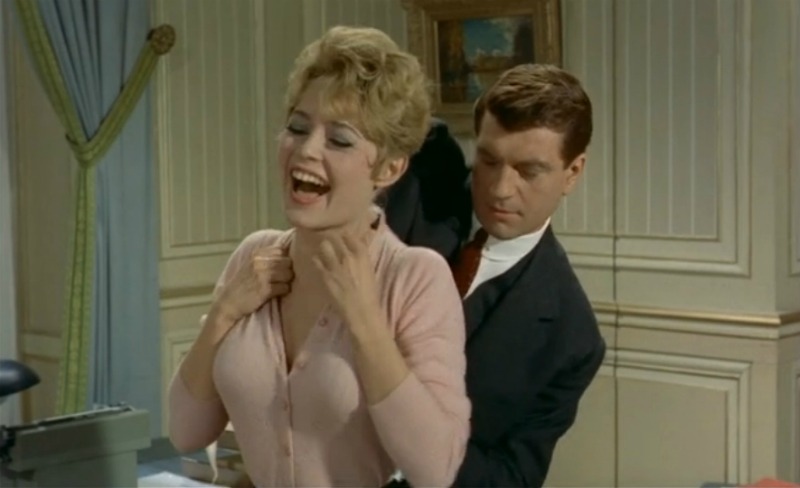
Beautiful actresses rarely get their due in the era in which they work, but over time, their iconography slowly translates into a re-appropriation of their careers that often ends positively. Given this process, it’s little wonder that Brigitte Bardot has endured these many years. Long after the notoriety and scandals have washed away, we are left with the only element that mattered in the first place – her undeniable screen presence. It is one thing to say Bardot was beautiful; that much is self-evident. It is another to to say she commanded the screen. When you watch Contempt or And God Created Woman, you cannot help but be mesmerized in a way that goes well beyond mere attraction. Thousands of beautiful women have appeared in many more thousands of films. Few have the lasting power of Bardot.
In 1957, she was still fairly new to the scene. And God Created Woman had come out just the year before, and though she’d already played in films outside of France, they amounted only to bit parts (in Helen of Troy, she didn’t even play Helen). Despite her relatively low profile in the films themselves, she was garnering quite a reputation as a celebrity, in no small part because of her habit of wearing few articles of clothing in said roles. It was And God Created Woman that really launched her profile. Director Roger Vadim was intent on revealing her capacity as a dramatic actress (which was, admittedly, limited), and if there’s one way to get taken seriously in the acting profession, it’s to act in a serious role. She immediately went from making upwards of six films a year to perhaps one or two until she retired in 1973.
So when Une Parisienne was released, audiences already knew her game. In a review upon its U.S. release, A.H. Weiler makes numerous allusions to her preferred state of dress, writing:
“Mlle. Bardot, to put a fine point on it, previously has been exposed to American moviegoers in more than a half-dozen weightless romances that served merely as frames for her astounding figure. Things have not changed too much in La Parisienne. Mlle. Bardot is not over-dressed in this lampoon, either.”

While an understandable angle, Weiler perhaps overstates one case while drastically understating the other – that Bardot is a very capable comedic performer. In the film, she plays the daughter (also named Brigitte) of the Prime Minister of France who’s in love with his top aide, Michel Legrand (Henri Vidal), an amorous fellow who avoids her for fear of “complications” (though the complications of sleeping with other mens wives doesn’t bother him terribly). When she forces herself into a rather compromising position with him that goes public, her father forces them to marry, a situation that pleases neither until it pleases them tremendously.
But Michel’s cheating heart cannot be kept at bay for long, and the rest of the film becomes a very entertaining battle of allegiances, made all the more so by the arrival of a prince (Charles Boyer), to whom Brigitte takes a liking. The “bored rich girl” is a staple of screwball comedy, one at which Bardot excels in a wry, knowing performance. She is in full Marilyn Monroe mode here, only much more cunning, playing off her natural charms as often as she indulges them. She makes a perfect sparring partner for the uptight Vidal and a winning dance one (literally and figuratively) with the more easygoing Boyer. The question is never with which man she will settle, but what hoops she’ll make him jump through to earn it, and her obvious delight at setting up every obstacle makes for wonderful cinema. When she calls her husband from an airport detailing an elaborate, unbelievable affair that she is about to make quite believable, she balances Brigitte’s pleasure in torturing Michel with her desire to truly win him over in a subtly honest manner that rounds out her character without undermining the comedy.
Director Michel Boisrond never really made a splash (it’s telling when his defining trait in his Wikipedia entry is “known for his dependability and his competently made films”), but he manages the action very well here, keeping things moving at a nice clip and ramping up the actors’ performances in messy situations. His blocking in a scene in which Brigitte impersonates a maid is grand stuff, and of course, going full-tilt for a barroom brawl for your finale is always a good choice. Because I think we’ve always secretly wanted to see Brigitte Bardot punch out a gangster or two.

And yes, Boisrond is well aware of what people come to see, so yes, there is many a scene in which Bardot runs about with little-to-no clothing on (though any potentially offensive body parts are tastefully obscured). When he gets to a scene in which Bardot is chased about the house in nothing more than a towel, one wonders whether there’s a predatory side to his direction or he’s just having fun with an audience’s limits of seeing everything but the kitchen sink so to speak, but if one were eager to pick a fight over the exploitation of women’s bodies, one would do well to seek a better target. Boisrond uses the teased nudity and sexuality in a manner that both indulges and mocks those who have come for only that.
I was worried about the video quality of Une Parisienne on Criterion’s Hulu channel going in, as color photography is infinitely more difficult to replicate on digital formats, and this is but a mere standard-definition transfer. Nevertheless, it gets a certain tone just right while admittedly not looking terribly film-like. I’m not entirely sure what to make of the aspect ratio – the 1.66:1 frame on Hulu looks correct (well-balanced, nothing cut off, etc.), but the film is listed as 1.37:1 on IMDb. Since the latter is so often incorrect on such matters, I’m giving Criterion the benefit of the doubt. On my HDTV, it appeared with two slim black bars on either side to accommodate it, while on my computer, it appeared as a cropped full-frame image (black bars all around the image). I suspect this has to do with it being an SD transfer that my TV is smart enough to zoom in on, but I couldn’t say for sure.
It’s hard to imagine Criterion going full Blu with a minor title like this from a no-name director, but hey, they’ve surprised before. I would love to see a “French Comedies of Brigitte Bardot” Eclipse set, though, if for no other reason than I could then see Bardot in other comedic performances.
Get 2 weeks free when you sign up for a Hulu Plus account!


